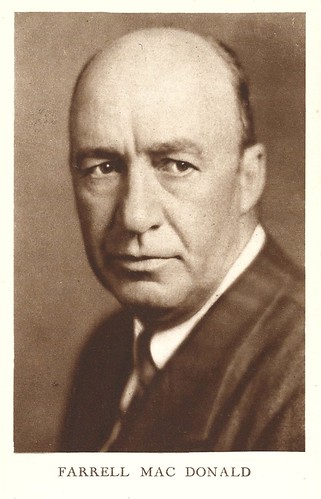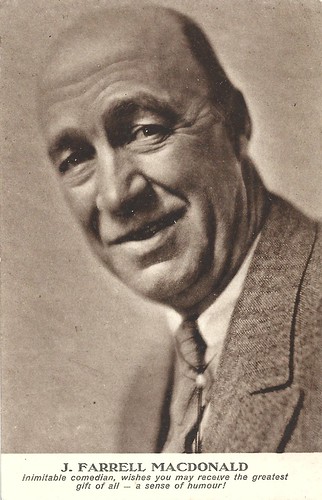
German postcard by Ross Verlag, Berlin, no. 1652/1, 1927-1928. Photo: Witzel, Hollywood / Fox.
Among the most popular character actors in Hollywood
J. Farrell MacDonald was born in 1875 in Waterbury, Connecticut. He began his career singing in minstrel shows, despite a degree from Yale University. After years of touring the United States with theatre troupes, he made his first film appearance in 1911 with film pioneer Carl Laemmle's production company IMP. After he had worked as an actor in numerous films, he also got directing jobs from 1912.
He was a director of more than 50 movies between 1912 and 1917, among them some quite lavish productions of their time. L. Frank Baum had MacDonald film his book 'The Wizard of Oz' in several parts, including The Patchwork Girl of Oz (J. Farrell MacDonald, 1914) and His Majesty, the Scarecrow of Oz (J. Farrell MacDonald, 1914). Harold Lloyd and Hal Roach got their first acting and extra roles through MacDonald when they were both still completely unknown.
Later, when Roach had founded his own film studio with Lloyd as his main star, they brought MacDonald in temporarily as director. In parallel with his directing work, however, MacDonald continued to appear in films as an actor, and by 1918 he was among the most popular character actors in Hollywood. He ended his career as a director to work exclusively as an actor.
In 1919, J. Farrell MacDonald made his first film with John Ford called A Fight for Love, and they made three more films together that same year. Ford and MacDonald would make a total of 25 films together over the decades. In the 1920s, MacDonald appeared in Ford's films The Iron Horse (1924), Kentucky Pride (1925), The Fighting Heart (1925) and 3 Bad Men (1926) in which he was one of the three, together with Tom Santschi and Frank Campeau.
The German director Friedrich Wilhelm Murnau used him as the friendly photographer in Sunrise (1927) and the clown in the lost film 4 Devils (1928). MacDonald also starred in many late silent comedies such as Ford's Riley the Cop (John Ford, 1928) in which he played the title role, The Cohens and the Kellys in Paris (William Beaudine, 1928) in which he co-starred with George Sidney, and Bringing Up Father (Jack Conway, 1928) in which he had the title role again, opposite Marie Dressler.

British postcard by Film Weekly. Photo: M.G.M. Marion Davies and J. Farrell MacDonald in the Pre-Code movie Peg O'My Heart (Robert Z. Leonard, 1933). Marion Davies stars as a poor Irish girl who stands to inherit a fortune if she satisfies certain conditions. She is taken away from her father (MacDonald) and brought to the posh estate of her late grandfather. Within three years she has to learn to become a lady.

British postcard in the Film Shots series by Film Weekly. Photo: Radio (RKO). Elissa Landi, Henry Stephenson and Francis Lederer in Man of Two Worlds (J. Walter Ruben, 1934). In the background J. Farrell MacDonald.
Tugboat captains, policemen, military men or judges
With the advent of the talkies, J. Farrell MacDonald remained a busy and well-known actor in major supporting parts in such films as The Painted Desert (Howard Higgin, Tom Buckingham, 1931) with William Boyd and William Farnum, The Phantom Express (Emory Johnson, 1932) with William Collier jr., Peg O' My Heart (Robert Z. Leonard, 1933) with Marion Davies, Murder on the Campus (Richard Thorpe, 1933) with Charles Starrett, Beggar's Holiday (Sam Newfield, 1934) with Sally O'Neill, Waterfront Lady (Joseph Santley, 1935) with Ann Rutherford, and Stormy (Lew Landers, 1935) with Jean Rogers.
Still, overall, his roles became increasingly smaller. He often played paternal or stern-seeming workers, tugboat captains, policemen, military men or judges; frequently in Westerns or crime films. In the 1930s and 1940s, he was used by Frank Capra, Hal Roach, John Ford and in particular Preston Sturges, with whom he did seven films including Sullivan's Travels (1941).
A last lead he had in The Last Alarm (William Beaudine, 1940), a Monogram production about a retired chief of the Fire Department who finds and unmasks an arsonist. Yet, from about 1940, MacDonald was increasingly uncredited for his small roles, including his appearance as an enraged man whose tree James Stewart drives into in It's a Wonderful Life (Frank Capra, 1946).
One of his last major roles was as the innkeeper in John Ford's My Darling Clementine in 1946. He also made a few television appearances in his last years. He worked as an actor until his death. For a time, MacDonald also taught acting at the University of Southern California.
J. Farrell MacDonald was married to the actress Edith Bostwick (1882-1943) until her death in 1943. They had one daughter. MacDonald died in 1952 in Hollywood, California, at the age of 77 and is buried in the Chapel of the Pines Crematory in Los Angeles.

Belgian postcard/ collector's card. Weekblad Cinema, Antwerpen.

British promotional postcard. "J. Farrell MacDonald stars in the following Fox Films: The First Year, The Shamrock Handicap, A Trip to Chinatown, 3 Bad Men, The Family Upstairs, The Country Beyond. All showmen should book these." All these film titles date from 1926.
Sources: Wikipedia (German and English) and IMDb.
No comments:
Post a Comment